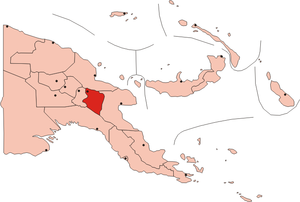Zambia (people)
Zambia is an ethnic group on the southern edge of the Eastern Highlands Province in Papua New Guinea . They live in isolation, their language is spoken by around 2,300 people. Like other populations in New Guinea, they live from horticulture; preference is given to growing sago , yams , taro and various types of vegetables. In contrast to many neighboring peoples, pig farming plays a very subordinate role both as a domestic animal husbandry and as a source of food. The Zambia do not practice any form of ceremonial exchange such as the Iatmul .
The descendant structures are patrilinear . The husband or his family take up residence after marriage . The local groups form the cooperative units, the clans ( lineages ) merge to pursue higher-level interests . Most marriages are concluded within the common village, with sister-swap marriage being customary. Today the arrangement of bridal gifts is increasingly emerging .
Cultural research history
The term Zambia has not grown in terms of cultural history or ethnosociology , but rather a pseudonym created by the American anthropologist and sex researcher Gilbert Herdt . Herdt examined the meaning and practices of sexuality in the cultures and societies of Papua New Guinea (sexual behavior, male identity formation and gender symbolism). With the Zambia, he encountered a unique sexual practice, which would of course not be compatible with the Western consciousness, which is why he concealed the identity of the people in order not to establish a concrete reference.
The study itself found that the sexual development of Zambian men was subject to three phases. Boys had to make themselves available to adults for sexual services. As adolescents, they were used for oral sex . Only in adulthood did the heterosexual determination as a man come into being. According to reports, Herdts sperm in Zambia fetishism . By virtue of its transformation potential, the sexuality of men is directed towards the creation of children within the female body as a transformation container that converts the male semen into bones and skin, muscles and internal organs. The semen has the power of initiation , the uterus that of transformation. According to the ideas of Zambia, a single sexual act is not enough to conceive a child, which is why multiple sexual intercourse (during pregnancy) is necessary.
Since the later-born boy lacks physical autonomy, further initiations are required in order to become a grown man. The boys and adolescents therefore continually receive seeds that strengthen them and help them to attain the essential virtues. This includes bravery and all the qualities that make them successful warriors. The cycle closes insofar as men can turn breast milk into sperm. In order to counteract the finiteness of the potency of the sperm-producing organ ( kerekukereku ), the men in secret rites ingest the sap of long aerial roots of a certain pandanus species , which is regarded as a surrogate for breast milk and restitutes the forces. This secret knowledge remains with men. The fact that women, on the other hand, can convert sperm into breast milk is considered general social knowledge and they only need to be "fed" with semen.
Herdt suspected that the men of Zambia perceive sexuality more as “work”, but nevertheless stated: “ ... women and boys get semen, men get erotic pleasure ”. The subject has not yet been adequately scrutinized scientifically.
→ See also: People of the Marind-anim in the south of the Indonesian western New Guinea
→ See also on the role of women: Bimin-Kuskusmin in the Telefomin Cuscus district of the Highlands
literature
- Susanne Schröter : Witches, warriors, cannibals , fantasy, domination and gender in New Guinea; Muenster; Hamburg: Lit. 1994 (women's cultures - men's cultures; 3.); ISBN 3-8258-2092-0
Web links
- Subject area psychology: Oedipus among savages: In a hill tribe in Papua New Guinea, two American scientists tried to find out why men become homosexual. ; spiegel.de , accessed on March 8, 2016
- Africa, Culture, Masculinization in Papua New Guinea (Roots): The Zambian Tribe Initiation of Boyz on Men , accessed on March 8, 2016
- Papua New Guinea's Zambia Tribe (June 2013) , accessed March 8, 2016
- Gilbert Herdt: Zambia. In: Encyclopedia of World Cultures , 1998.
Remarks
-
↑ a b c d e
On Zambia (explanations in the appendix), p. 301 f .; Compilation of the transformation potential of the sperm in Herdt: p. 122 ff .; On the question of the preparation of sexual pleasure, p. 109
Susanne Schröter : Witches, warriors, cannibals, fantasy, domination and gender in New Guinea (women's cultures - men's cultures; 3.) . In: Women's cultures - Men's cultures - Volumes 1-3) . tape 3 , no. 1 . LIT Verlag, Münster, Hamburg, Germany 1994, ISBN 3-8258-2092-0 , p. 372 (German; IT book version (accessed on March 5, 2016)). - ^ A b Gilbert Herdt : Guardians of the Flutes. Idioms of Masculinity . A Study of Ritualized Homosexual Behavior. McGraw-Hill Book Co., USA 1981, p. 325 (English; A Study of Ritualized Homosexual Behavior (accessed March 7, 2016)).
- ^ A b Gilbert Herdt: Rituals of Manhood: Male Initiation in Papua New Guinea. Male initiation in Papua New Guinea . Ed .: Introduction by Roger M. Keesing. Berkeley: University of California Press, USA 1982, p. 325 (English; Herdt: Rituals of Manhood (accessed March 7, 2016)).
